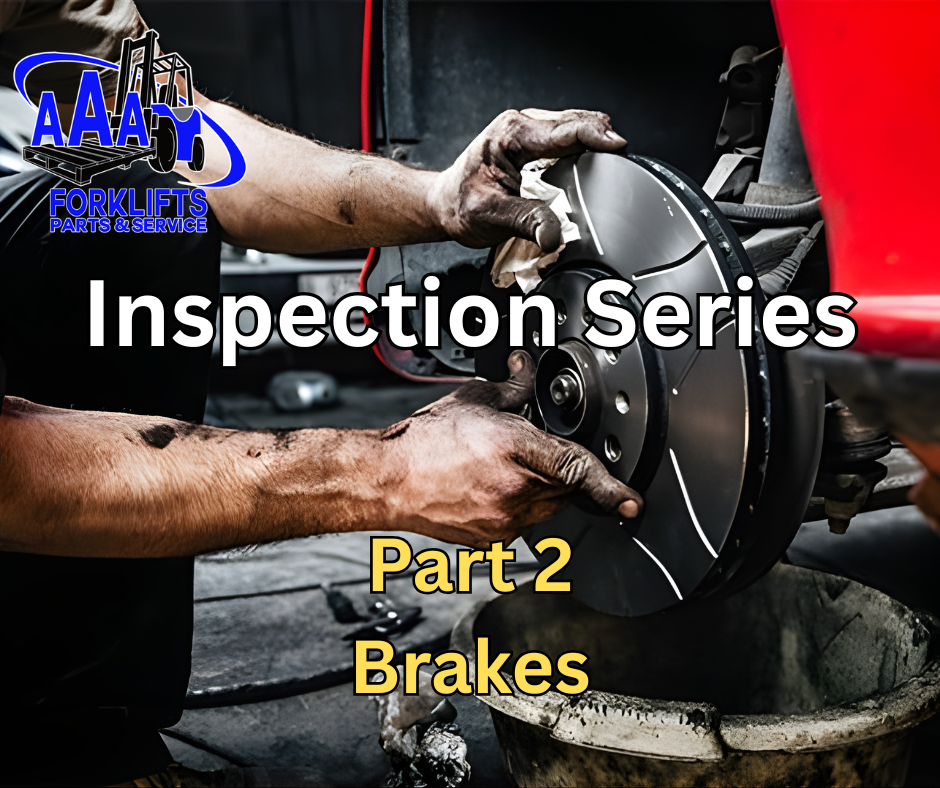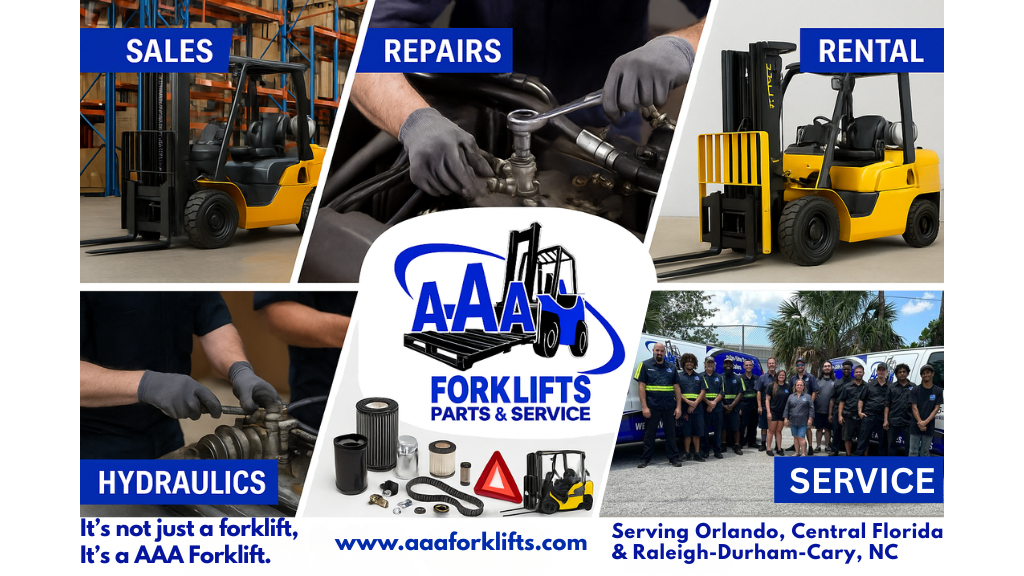Forklift Brake Inspection: Your First Line of Defense Against Workplace Accidents
In the world of material handling, your forklift's ability to stop is just as critical as its ability to lift. Welcome to Part 2 of our Forklift Inspection Series, where AAA Forklifts zeroes in on the most crucial safety system on your equipment: the brakes. Every load moved, every corner turned, and every shift completed relies on properly functioning brakes. Whether you operate electric forklifts or internal combustion models, daily brake inspections are non-negotiable for protecting both personnel and productivity.
Did You Know? According to OSHA data, brake-related issues contribute to approximately 20% of all forklift accidents. A simple 5-minute daily inspection could prevent most of these incidents.
Need Immediate Brake Inspection?
Our certified technicians in Orlando and Raleigh provide comprehensive brake system evaluations to keep your operations safe and compliant.
Schedule Your Brake Inspection TodayFrom hydraulic leaks to worn brake pads, brake failures represent one of the most common—and entirely preventable—causes of forklift accidents. That's why AAA Forklifts technicians in Orlando, FL and Raleigh, NC emphasize a simple but critical rule: Inspect your brakes before every single shift. A quick visual and functional check ensures your operators can stop promptly, safely, and in full compliance with OSHA's 1910.178 forklift standard.
Why Brake Inspections Are Non-Negotiable for Safety
Forklift brakes endure significantly more stress than automotive brakes. They manage high torque at low speeds, constant start-stop cycles in confined spaces, and the added challenge of shifting center of gravity when carrying heavy loads. In busy warehouses or outdoor yards, every inch of stopping distance matters—and could be the difference between a near-miss and a serious incident.
OSHA mandates that all powered industrial trucks must be maintained in "safe operating condition," which explicitly includes properly functioning service brakes, parking brakes, and all hydraulic components. Neglecting daily brake checks doesn't just jeopardize equipment—it puts your entire workforce at risk. Regular inspections not only prevent accidents but also reduce unexpected downtime and extend the lifespan of your braking components.
Understanding Your Forklift's Brake System
Forklifts utilize various braking systems depending on their design and power source:
- 🔹 Hydraulic Drum Brakes: The most common system on internal combustion (IC) trucks. A master cylinder pushes hydraulic fluid through brake lines to wheel cylinders, pressing shoes against a drum to create friction.
- 🔹 Hydraulic Disc Brakes: Found on higher-capacity or performance models, offering smoother stops and reduced brake fade under heavy loads.
- 🔹 Regenerative Braking: Primarily used in electric forklifts to recapture kinetic energy and automatically slow the truck when the accelerator is released.
- 🔹 Parking/Hand Brakes: Typically mechanical or cable-operated systems essential for holding the truck stationary during loading or when parked.
Regardless of the system type, all rely on proper fluid levels, seal integrity, and mechanical alignment. Even a minor leak or slightly worn pad can lead to complete brake failure—creating a serious safety hazard in your facility.
The 5-Minute Brake Inspection: A Step-by-Step Guide
Performing a thorough brake inspection should take less than five minutes. These are the same procedures AAA Forklifts' certified technicians demonstrate during our training and service programs:
- Check Brake Fluid: Ensure the reservoir is at the proper level with clear, uncontaminated fluid. Low fluid often indicates worn components or a leak.
- Inspect Brake Lines: Look for cracks, corrosion, or signs of moisture. Any leakage requires immediate attention—remove the forklift from service until repaired.
- Examine the Master Cylinder: Verify it's securely mounted with no visible leaks or damage.
- Test the Pedal: It should feel firm, not spongy. Excessive travel suggests air in the system or worn components.
- Parking Brake Test: Engage fully; it must hold the truck on an incline without movement.
- Visual Inspection: Check drums, discs, and pads for unusual wear patterns or contamination.
- Operational Test: Move the forklift slowly and apply brakes. The truck should stop evenly and straight without pulling or delay.
Document each inspection step using your daily checklist. At AAA Forklifts, we recommend our comprehensive Forklift Inspection Report to record findings, track recurring issues, and maintain compliance with both OSHA and manufacturer standards.
Recognizing Common Brake Problems
Most operators first notice brake issues through changes in pedal feel or increased stopping distance. Understanding these symptoms helps you take corrective action before complete failure:
- Spongy Pedal: Typically indicates air in hydraulic lines or contaminated fluid.
- Pulling to One Side: Suggests uneven pad wear or a seized wheel cylinder.
- Grinding or Squealing: Signals worn shoes/pads or debris in drums/rotors.
- Brake Fade: Results from overheating due to overuse or contaminated friction surfaces.
- Pedal Sinks Slowly: Points to an internal leak in the master cylinder or wheel cylinder failure.
When any of these symptoms appear, immediately remove the forklift from service. Continued operation could lead to catastrophic failure and potential injury.
Watch Our Brake Inspection Demonstration
In this second episode of our Forklift Inspection Series, our general manager walks through a complete brake system inspection—demonstrating what to check, how to assess pedal feel, and how to identify issues before they escalate. Watch below:

Integrating Brake Inspections Into Your Preventive Maintenance Program
While daily brake checks catch immediate issues, pairing them with a comprehensive planned maintenance program ensures long-term reliability. AAA Forklifts' Preventive Maintenance programs include 120-point inspections covering all hydraulic, steering, and braking components. During a PM visit, our certified technicians:
- • Thoroughly inspect and replace brake shoes, pads, and drums as needed
- • Flush and replace hydraulic fluid if contaminated or beyond service life
- • Check parking brake cable tension and lubrication points
- • Verify brake light function and pedal linkage condition
- • Provide a detailed report on wear levels and service recommendations
Combining these professional checks with daily operator inspections keeps your equipment in optimal condition. This proactive approach prevents unexpected downtime, avoids OSHA violations, and extends your forklift's operational lifespan.
The Real Cost of Brake Neglect: Safety, Savings, and Uptime
A failed brake system doesn't just halt production—it can cause costly product damage, workplace injuries, and regulatory penalties. By implementing consistent brake inspections, you're not only ensuring compliance but actively reducing your total cost of ownership.
On average, a single unscheduled brake repair can exceed $1,500 in parts and labor, not including productivity losses from downtime. In contrast, preventive checks take minutes and cost virtually nothing. The return on proactive maintenance is undeniable: safer operations, lower repair costs, and extended equipment life.
When to Call AAA Forklifts for Professional Service
If you discover fluid leaks, grinding noises, inconsistent braking, or poor pedal response, immediately remove the forklift from service and contact our professionals. AAA Forklifts provides both on-site service and in-shop repairs for all major makes and models throughout Orlando and Raleigh.
Our expert team specializes in hydraulic hose replacements, wheel cylinder rebuilds, master cylinder replacements, and complete brake system overhauls—restoring your equipment to factory-safe condition with minimal disruption to your operations.
Don't Wait for Brake Failure
Our certified technicians in Orlando and Raleigh are ready to inspect, maintain, or repair your forklift brake systems. Schedule service today for peace of mind tomorrow.
Schedule Your Brake Service NowServing Central Florida and Eastern North Carolina




Leave a comment
This site is protected by hCaptcha and the hCaptcha Privacy Policy and Terms of Service apply.